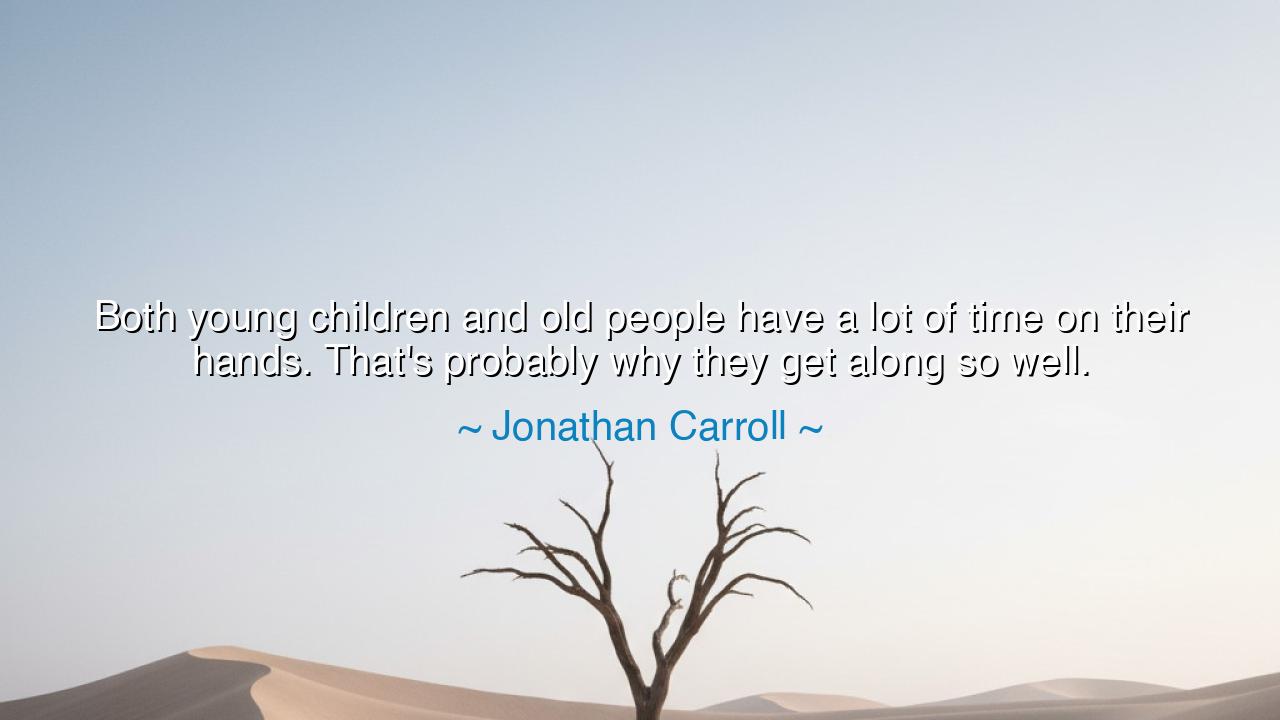
Both young children and old people have a lot of time on their
Both young children and old people have a lot of time on their hands. That's probably why they get along so well.






The novelist of the strange and the profound, Jonathan Carroll, once observed with gentle wit: “Both young children and old people have a lot of time on their hands. That's probably why they get along so well.” What at first seems like a simple remark about companionship hides a truth about the rhythm of human life. For in the beginning and at the end of our days, we stand outside the feverish rush of the world. The child and the elder alike dwell in the wide spaces of time, and it is there, in those unhurried hours, that they meet in harmony.
The origin of this quote lies in Carroll’s reflections on human nature, often expressed through his imaginative and paradoxical storytelling. He was a writer fascinated by the intersections of the ordinary and the extraordinary. Here he notes how children, unburdened by responsibility, and the elderly, released from it, share the same gift: time unclaimed. This unclaimed time becomes a bridge between them, allowing them to laugh, to wonder, to listen, and to see life through eyes unclouded by the urgency of productivity.
The ancients, too, saw this cycle. Aristotle wrote that “the end is in the beginning,” and in this saying is the recognition that the old return in spirit to the simplicity of the young. The philosopher Cicero, in his essay On Old Age, argued that old men often rediscover the joys of play, learning, and storytelling once the burdens of duty have passed. The Greeks spoke of life as a circle, not a line: what is lost in the middle years of striving returns in the gentler seasons of youth and age. Thus Carroll’s words echo an ancient wisdom: those with time in abundance find companionship in one another.
History gives us touching examples of this truth. Consider the life of Mark Twain, who often spent hours speaking and playing with children in his later years. Freed from the demands of fame and labor, he found joy in their laughter and curiosity. Likewise, many elders across cultures have been the guardians of story, passing down traditions to the young who sit at their feet. In these moments, the child’s hunger for stories meets the elder’s abundance of them, and time itself seems to pause as wisdom and wonder flow between generations.
The meaning of Carroll’s words is thus not only tender but profound. He reminds us that what truly bonds human beings is not shared duty or ambition, but shared time. Children and elders do not rush each other. They have the patience to linger, to repeat, to notice small things. The bird at the window, the shape of a cloud, the memory of a distant past—all these are treasures to them. Their companionship is effortless because it is unhurried.
The lesson for us is clear: in the middle of life, when our days are crowded and our hours consumed, we should learn from children and elders. Slow down. Allow yourself to create time for play, for reflection, for the simple presence of others. Do not imagine that life’s worth is only in speed and accomplishment. The beauty of existence is often revealed only when we are still enough to see it.
In practice, I counsel this: set aside time to sit with the very young and the very old. Let the child teach you wonder, and let the elder teach you wisdom. Do not rush them—receive their gifts. And in your own life, carve out unhurried spaces, even in busy seasons, to remember that you too are more than your labor. For in stillness, as Carroll shows us, lies the deepest connection.
Thus, remember Jonathan Carroll’s insight: “Both young children and old people have a lot of time on their hands. That's probably why they get along so well.” Time is the soil of love and companionship. If you would strengthen your bonds with others, do not give them only your words or deeds—give them your time. For in the end, it is time shared, not time spent alone, that remains as the truest wealth of life.






AAdministratorAdministrator
Welcome, honored guests. Please leave a comment, we will respond soon